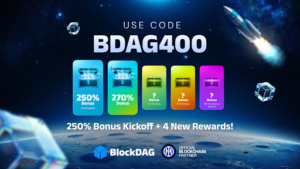
According to a press release reported yesterday by Securitize, BlackRock has just expanded into the multichain market with its tokenized fund BUIDL.
The largest asset manager in the world has launched new RWA share classes on the Aptos, Arbitrum, Avalanche, OP Mainnet, and Polygon networks.
The decision follows the growing interest of investors in the world of tokenized capital and the need to expand to as many infrastructures as possible.
Let’s see all the details below.
BUIDL by BlackRock becomes multichain: 5 new chains added
As reported yesterday by Securitize, a well-known RWA tokenization platform, BlackRock’s BUILD fund would have opened the doors to multichain connections.
In an announcement released by PR Newswire, the investment company revealed its intention to reach a dozen new chains.
In this initial phase, “BlackRock USD Institutional Digital Liquidity Fund” (BUIDL) was distributed on Aptos, Arbitrum, Avalanche, OP Mainnet of Optimism, and Polygon.
The new classes of shares will allow for increased efficiency of the investment product, taking advantage of all the opportunities offered by blockchain technology.
Initially, BUILD was marketed only on Ethereum, being the most secure and decentralized network in the cryptographic industry.
Now, however, BlackRock wants to fully ride this trend of strong adoption of RWA funds, seeking to gather more capital with the multichain approach.
In fact, by doing so, it encourages users of a single ecosystem to invest in the tokenized fund without having to go through bridges and high network commission costs.
Each new network allows customers to interact natively with BUIDL, obtaining a yield with flexible custody, real-time P2P transfers, and dividend installments.
Carlos Domingo, CEO of Securitize, confirmed the intention to attract new investors by making BUILD a multichain product:
“We wanted to develop an ecosystem that was thoughtfully designed to be digital and leverage the advantages of tokenization. […] we are excited to add these blockchains to increase the potential of the BUIDL ecosystem. With these new chains, we will start to see more investors looking to leverage the underlying technology to increase efficiency in all things that have been difficult to do until now”.
The success of BlackRock’s RWA fund
The entry into the multichain world marks the success of BUIDL by BlackRock, which to date represents the largest RWA fund in the world.
With an asset under management (AUM) equivalent to 544 million dollars, it indeed leads the ranking of tokenized private treasuries, according to the RWA.xyz dashboard.
The BlackRock product went viral in a very short time, attracting more capital than all other competitors in just 40 days from its debut in 2024.
The majority of the value invested in the fund comes from the Ethereum blockchain with 513 million dollars. An amount of 26.1 million dollars has already been invested in Optimism while another 1.4 million dollars have arrived on Polygon.
This fund offers institutional investors the opportunity to achieve returns in dollars through an instant and transparent settlement, in an efficient and secure manner.
Through the participation of Securitize Markets, LLC, users invest indirectly in short-term Treasury bills (T-Bills) and low-risk securities.
The bank BNY Mellon allows interoperability transactions for BlackRock between digital and traditional markets. Coinbase acts instead as an infrastructure partner.
Generally, BUILD guarantees a yield of 4.5%, with the value of the shares remaining fixed at 1 dollar.
The so-called “management fees”, or the annual management costs that end up in BlackRock’s pockets, range from 0.20 to 0.50%.
The entry of the fund into the multichain variety complicates the picture of the fees because each chain presents a different management cost.
On Aptos, Polygon, and Avalanche the costs are 0.20% (20 basis points), while on Arbitrum, Ethereum, and Optimism they are 0.50% (50 basis points).
The growing demand for RWA products and multichain tokenized funds
As mentioned, the choice to dive into the multichain world for BlackRock underscores the growing demand from investors for tokenized real-world products.
This kind of RWA token offers many advantages to holders as they allow for secure returns in a flexible custody environment.
Furthermore, they improve the liquidity in the trading of Treasury securities by reducing operational and settlement frictions, relying on the agnosticism of blockchain technology.
Investors can therefore take advantage of tokenized securities, such as those from BlackRock, to invest in low-risk activities with the highest possible transparency.
The RWA funds also unlock greater access to bond investments, providing the opportunity to participate even for users with limited resources.
Consider that currently the size of tokenized US Treasury Securities is around 2.4 billion dollars, compared to the 35 trillion of US public debt.
As BlackRock understood very well, there is still a huge portion of the market to be tokenized and conquered. The best way to embrace mass adoption was to go multichain with BUIDL.
In any case, RWA tokens are not only a tool that provides yield through the subscription of bond securities.
Tokenization affects a wide range of real-world interests, and can be leveraged in a myriad of different ways that are not yet fully explored.
As highlighted in this regard in a recent interview by Colin Butler, global head of institutional capital at Polygon:
“The RWA tokens — from T-Bills to artworks — represent a $30 trillion market opportunity globally, Colin Butler, global head of institutional capital at Polygon.”

 1 month ago
19
1 month ago
19








 English (US) ·
English (US) ·